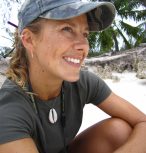DNA reveals the past and future of coral reefs
New DNA techniques are being used to understand how coral reacted to the end of the last ice age in order to better predict how they will cope with current changes to the climate. James Cook Univer

From 2005 to 2022, the main node of the ARC Centre of Excellence for Coral Reef Studies was headquartered at James Cook University in Townsville, Queensland (Australia)








Abstract: Mesopredators represent an important component of coral reef ecosystems, both economically, as an important component of reef fisheries, and ecologically, as potentially important drivers of reef trophodynamics. The lack of knowledge of how this functional group is affected by reef degradation and benthic community shifts and how this influences their role in the food web is cause for concern, particularly given the widespread threats facing coral reefs. Tessa’s thesis aims to address this research gap by focusing on four key implications of habitat degradation for mesopredators and their role in coral reef trophodynamics. Firstly, it will examine the sublethal effects (e.g. reduced growth rates, fecundity and condition) of changing prey availability associated with habitat degradation on piscivorous mesopredators that may impact their populations in the long term. Next, stable isotope techniques will be used to investigate whether mesopredators are able to alter their diets to exploit changing prey resources following disturbance. In order to better understand the effects of changing habitat condition on food web structure and implications for mesopredators, long term data sets will be analysed to assess how trophic pyramid shape and fish community size spectra change through time in relation to reef state. The final chapter aims to quantify the effects of predicted changes in coral assemblages on reef fish community structure by means of a meso-scale patch reef experiment, which will also use caged predator treatments to investigate the effects on predator-prey dynamics.
Biography: Tessa grew up on a farm in the savannas and escarpment forests of South Africa, an environment that instilled in her a passion for ecology from a young age. After a year in Tasmania as a Rotary Scholar, she began her undergraduate studies via correspondence with the University of South Africa (UNISA) while travelling and working in SCUBA diving. In 2003 she returned to South Africa to complete her BSc. in Botany and Zoology at the University of Cape Town (UCT), followed by a BSc. Hons in Zoology, a field course in the Kruger National Park with the Organisation for Tropical Studies (OTS) and a MSc. in Conservation Biology from the same university. Her study subjects ranged from the impacts of elephants on savanna vegetation and bat community ecology to upwelling system dynamics, crinoid symbionts and the effects of dynamite fishing on coral reefs in Tanzania. Since graduating she has worked as a conservation manager for the Sustainable Seas Trust (SST), sailed the South American coast, volunteered as a researcher on the Aldabra Atoll World Heritage Site in the Seychelles and managed diving and marine logistics on Vamizi Island in the Quirimbas Archipelago of Mozambique, before deciding it was time to fulfill a lifetime aspiration of pursuing a PhD in coral reef ecology at James Cook University.
New DNA techniques are being used to understand how coral reacted to the end of the last ice age in order to better predict how they will cope with current changes to the climate. James Cook Univer
A new study on the effects of climate change in five tropical countries has found fisheries are in more trouble than agriculture, and poor people are in the most danger. Distinguished Profess
James Cook University researchers have found brightly coloured fish are becoming increasingly rare as coral declines, with the phenomenon likely to get worse in the future. Christopher Hemingson, a
Researchers working with stakeholders in the Great Barrier Reef region have come up with ideas on how groups responsible for looking after the reef can operate more effectively when the next bleaching
Abstract: As marine species adapt to climate change, their heat tolerance will likely be under strong selection. Individual variation in heat tolerance and its heritability underpin the potential fo
Abstract: The Reef Ecology Lab in KAUST’s Red Sea Research Center explores many aspects of movement ecology of marine organisms, ranging from adult migrations to intergenerational larval dispersal
Abstract: Macroalgal meadows are a prominent, yet often maligned component of the tropical seascape. Our work at Ningaloo reef in WA demonstrate that canopy forming macroalgae provide habitat for ad
Abstract: Sharks are generally perceived as strong and fearsome animals. With fossils dating back at least 420 million years, sharks are not only majestic top predators but they also outlived dinosa
Abstract: Connectivity plays a vital role in many ecosystems through its effects on fundamental ecological and evolutionary processes. Its consequences for populations and metapopulations have been
Abstract: Evolution of many eukaryotic organisms is affected by interactions with microbes. Microbial symbioses can ultimately reflect host’s diet, habitat range, and even body shape. However, how
Abstract: The past few years have seen unprecedented coral bleaching and mortality on the Great Barrier Reef (GBR) but the consequences of this on biodiversity are not yet known. This talk will expl